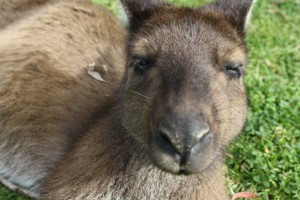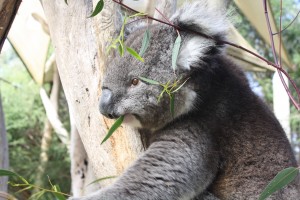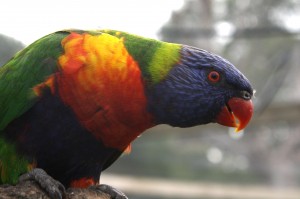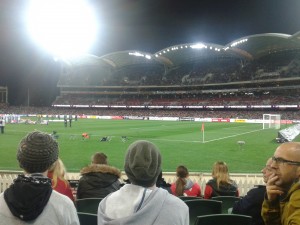PART I: ARRIVAL
An Englishman in Australia feels oddly at home. A stroll down the clean, wide pavements of Adelaide will carry frequent snatches of British accents to him on the wind, and his turns of phrase, slang and general outlook will rarely leave baffled expressions, as they might in America or elsewhere. Cars pass him from right to left, lifts in a building are called ‘lifts’, and people don’t burst with overwhelming excitement when presented with the choice to either squeal “That is soooo cute!” or guffaw inanely, because he has earnestly thanked them by saying “Cheers”, as is a real and worrisome danger in certain other parts of the world. In fact, he may well himself be wished ‘ta’, be addressed as ‘mate’, or be asked his ‘mobile’ number.

There are, however, clues everywhere that Australia is not just a leftover British colony. Were he to give an Australian directions in yards or miles, and they might eye him as if he is attempting to slip in instructions for them to fall off the nearest bridge. Search through his wallet for a few cents’ change and a nearby Australian will begin, exasperatedly, to explain that their nation has done away with the unnecessary clutter of any denomination of less than five cents. More significantly, clean, new buildings line energetic, well-dressed streets, and a national knack and willingness to cherry-pick some of the best public ideas from around the world will leave our Englishman ever so slightly embarrassed about his home country: glass pedestrian bridges arcing across the river; city bicycles free for use; and a bus and tram network which doesn’t require a mortgage for each trip; all create an impression of a progressive, prosperous and thoughtful Australia. This is, one begins to feel, a nation which knows that it is in the eye of the world; over a quarter of all Australians in the last census were immigrants, and that many again visit each year as a tourist. Consequently, one senses a pride in the outward appearance and wealth of Australian life, which has another curious and slightly bitter side effect to which I shall return later.
 It had taken me, in total, twenty-nine hours to get from check-in at London Heathrow to the exit of Adelaide International Airport, at a distance of just over ten thousand miles (or, for our Australian readers, about sixteen thousand kilometres. For our American cousins, a little way over fifty-three million feet) but eventually I came, bleary-eyed, out of Arrivals, at 0800 on a cool, damp, Australian winter’s dawn. A lift to my accommodation had been pre-booked through the company who ran the halls in which I was staying – Urbanest, whose Adelaide site is located superbly at the Northern end of the Central Business District of Adelaide; a square region at the heart of the city, containing the university, government buildings, shops, theatres and much more, and insulated from the outside by a thick band of parkland. I quickly signed my paperwork, dumped my things and headed out for a walk. My bank was closed, and until I could prove my identity in person, I had no Australian dollars at all, so I used the hour before it opened at 0930 to quickly explore the area.
It had taken me, in total, twenty-nine hours to get from check-in at London Heathrow to the exit of Adelaide International Airport, at a distance of just over ten thousand miles (or, for our Australian readers, about sixteen thousand kilometres. For our American cousins, a little way over fifty-three million feet) but eventually I came, bleary-eyed, out of Arrivals, at 0800 on a cool, damp, Australian winter’s dawn. A lift to my accommodation had been pre-booked through the company who ran the halls in which I was staying – Urbanest, whose Adelaide site is located superbly at the Northern end of the Central Business District of Adelaide; a square region at the heart of the city, containing the university, government buildings, shops, theatres and much more, and insulated from the outside by a thick band of parkland. I quickly signed my paperwork, dumped my things and headed out for a walk. My bank was closed, and until I could prove my identity in person, I had no Australian dollars at all, so I used the hour before it opened at 0930 to quickly explore the area.
So it was that eighty-four thousand commuting Australians on a dreary Wednesday morning had to weave and wind their way around a young Englishman as he bumbled along the streets of Adelaide, grinning inanely at nothing and everything, as if possessed by a rather dim ghost. Approximately sixteen hundred of these people hesitated as they went past, most of whom wondering if there was an open manhole anywhere convenient into which they might trip the unsuspecting fool, but at least a dozen of whom beginning an immediate and urgent search for his carer.
I was somewhat jubilant at the realisation that I was, finally, as I had daydreamed about for months, standing on hard ground in Australia, entirely isolated from anyone that I knew, and with everything to do. And so I spent my first day down under, wandering from minor task to minor task – getting money, buying electrical adapters, food and so on – in a happy state of exploration, numbed by jetlag and a blissful sense of surrealism.
 Before bedtime – which I forced myself to delay as long as I could, having slept for less than six good hours in the last seventy-five – I unpacked a few things from my case, made my bed and took a moment to examine my quarters more closely. Twelve hundred dollars (about six hundred and fifty pounds) per month has bought me a neat, utilitarian but well-fitted single ensuite study bedroom, sharing a kitchen and lounge area with four others in a flat. Australia is not cheap – a point to which I shall return – but Urbanest especially not so. I had settled for Urbanest mainly for simplicity – to avoid searching for accommodation in an unknown country, to save an unknown amount of money – but I began to regret my decision quickly, as other international student had little difficulty in quickly finding much nicer accommodation for over a hundred dollars per week less. The flat is on the fifteenth floor (counting the ground floor as zero; another sensible Australian custom that is comfortably familiar to a British visitor) and my room especially affords an excellent view to the West, over the city and airport to the ocean gulf beyond.
Before bedtime – which I forced myself to delay as long as I could, having slept for less than six good hours in the last seventy-five – I unpacked a few things from my case, made my bed and took a moment to examine my quarters more closely. Twelve hundred dollars (about six hundred and fifty pounds) per month has bought me a neat, utilitarian but well-fitted single ensuite study bedroom, sharing a kitchen and lounge area with four others in a flat. Australia is not cheap – a point to which I shall return – but Urbanest especially not so. I had settled for Urbanest mainly for simplicity – to avoid searching for accommodation in an unknown country, to save an unknown amount of money – but I began to regret my decision quickly, as other international student had little difficulty in quickly finding much nicer accommodation for over a hundred dollars per week less. The flat is on the fifteenth floor (counting the ground floor as zero; another sensible Australian custom that is comfortably familiar to a British visitor) and my room especially affords an excellent view to the West, over the city and airport to the ocean gulf beyond.
 The week after my arrival was ‘orientation week’ at the university, and around six hundred international students had just arrived in the city, all, like me, fresh faced and eager to get started. I went for tours of the campus facilities, sat in lectures on Australian culture (‘We don’t often say “throw another shrimp on the barbie”’) and met other travellers by the dozen. Encountering so many people from around the world, and hearing their bewilderment at various facets of Australian life served to remind me repeatedly that I hadn’t really travelled at all, culturally speaking. I therefore often found myself ‘playing the local’, defending or explaining how things worked down under, when I had, in fact, travelled furthest of all to get there. I quickly lost count of the conversations in which I explained that shops closing at 1730 was not a major inconvenience, once you were used to it. And so my first week passed, as a mass of small-talk with new faces speaking their second language, growing gradually louder as the conversations moved daily from lectures to cafés to pubs.
The week after my arrival was ‘orientation week’ at the university, and around six hundred international students had just arrived in the city, all, like me, fresh faced and eager to get started. I went for tours of the campus facilities, sat in lectures on Australian culture (‘We don’t often say “throw another shrimp on the barbie”’) and met other travellers by the dozen. Encountering so many people from around the world, and hearing their bewilderment at various facets of Australian life served to remind me repeatedly that I hadn’t really travelled at all, culturally speaking. I therefore often found myself ‘playing the local’, defending or explaining how things worked down under, when I had, in fact, travelled furthest of all to get there. I quickly lost count of the conversations in which I explained that shops closing at 1730 was not a major inconvenience, once you were used to it. And so my first week passed, as a mass of small-talk with new faces speaking their second language, growing gradually louder as the conversations moved daily from lectures to cafés to pubs.
It was only once term began, twelve days after my arrival, that I began to meet actual Australian students. This was different. Whereas meeting international students was as easy as finding someone with greased hair or a baffled expression musing over a handful of unfamiliar coins, in my lectures I would be sitting with thirty Australian students, living outside the city, who all already knew each other, and who were just sighing through the winter in their hometown. And so I took to arriving early for each lecture and flopping obnoxiously beside people who probably wanted to be left alone, and striking up conversations until they finally submitted, and conceded some discussion. Not, I hasten to add, that Australians are unfriendly, far from it. But, they are somewhat British; it just doesn’t do to approach strangers for a chat. For me, it was equally, if not more, alien, but I had resolved to meet people early, and meet ‘em hard, so around I went, lecture to lecture, with a foot-wide grin and my hand thrust out before me, forcibly meeting people. And, indeed, I quickly made friends.
One question that every Australian with whom I have spoken for more than five minutes has asked me is, “Why Adelaide. It’s nice and everything, but, you know? Why not Sydney, or Melbourne?” It is this question which cuts to the heart of Adelaide’s place in Australia, and it is to this that I shall return for my next instalment of Down Undercover.
See my videoblog here, especially if you want more of an idea of my situation in Adelaide.
